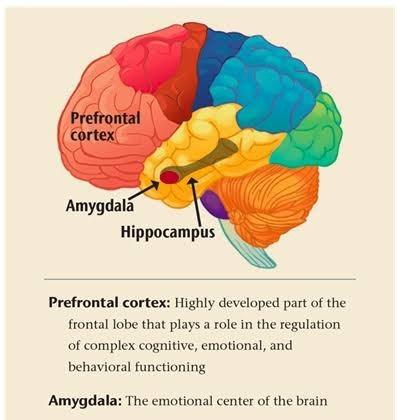What Is Oppositional Defiant Disorder?
Oppositional Defiant Disorder (ODD) is a type of childhood disruptive behavior and emotional disorder characterized by persistent patterns of angry or irritable mood, argumentative or defiant mood, and vindictiveness toward others.

Diagnostic Criteria According to DSM-5
At least four symptoms from the list below should have been present on most days for at least 6 months
- Often loses temper
- Often touchy or easily annoyed
- Often angry and resentful
- Often argue with authority figures or, for children and adolescents, with adults
- Often actively refuse or defy to comply with requests from authority figures or with rules
- Often deliberately annoys others
- Often blames others for his or her mistakes or misbehavior
- The child has been spiteful or vindictive at least twice within the past 6 months
Some Other Features
Children with oppositional defiant disorder have substantially strained relationships with their parents, teachers, and peers, and have high rates of coexisting conditions such as attention-deficit/hyperactivity disorder and mood disorders. The child may possess deficits in executive cognitive skills. These deficits undermine the child’s ability to comply with adult demands. Moreover, girls may show symptoms differently than boys, showing aggression through words rather than actions, and other indirect ways such as lying and being non-cooperative; on the other hand, a boy may lose his temper and argue with an adult.
Comorbidity
ODD is a strong risk factor for the development of CD in boys. On the other hand, ODD does not increase the risk of later development of CD in girls. However, ODD does increase the risk of ADHD symptoms, depression, anxiety, and learning disorders.
Etiology and Risk Factors for ODD
Genetics
It is estimated that the heritability of ODD is around 50%. Children with ODD may have close family members with mood disorders, anxiety disorders, and personality disorders.
Brain Structure
Neuroimaging findings have shown that particular abnormalities in the prefrontal cortex and amygdala are involved in Oppositional Defiant Disorder.

Neurotransmitters
ODD has been linked to special chemicals in the brain called neurotransmitters. Serotonin (5-HT) is one of the crucial neurotransmitters that control the behaviors of individuals by stabilizing mood, feelings of well-being, and happiness, and also has an impact on sleeping, appetite, aggression, and attention. Different studies have demonstrated that ODD patients have low levels of 5-Hydroxyindoleacetic acid (5-HIAA) and Homovanillic acid. Moreover, in one study, participants with a low activity level of the neurotransmitter metabolizing enzyme monoamine oxidase A (MAO-A) were found to be more likely to report anger, conduct problems, and hostility.
Treatment and Management For ODD
- Parent Management Training
- School-Based Interventions
- Cognitive Behavioral Therapy
- Medications
- Nutritional Plan
Nutrition Plan to Combat and Manage the Symptoms of ODD
Cells need fuel to work and process properly. What you put in your child’s body will impact his or her physical and psychological well-being. Many psychiatric and behavioral disorders are linked to food in terms of food nutrients regulating the activity of neurotransmitters.
Specific food choices can be made based on the underlying causes related to brain structures and neurotransmitter activity:
Serotonin and food
Serotonin is synthesized from tryptophan. The human body does not produce tryptophan, so it has to be consumed with nutrients. Tryptophan, which increases brain serotonin, is an effective antidepressant. Low levels are related to more fearful, emotional dysregulation, and low self-esteem.
- The brain part amygdala, is involved in ODD. The amygdala is a key player in the processing of emotions. This brain area is prominently modulated by the neurotransmitter serotonin (5-hydroxytryptamine, 5-HT).
- As ODD links to depression, frustration, and anxiety, nutrients related to serotonin can be beneficial in managing the symptoms.
- Among the foods with the highest content of tryptophan are bananas, green vegetables, vitamin B, almonds, legumes, and fish etc.
Vitamins
It is also well-established that deficiencies of several vitamins due to inadequate intake are associated with irritability, impulsivity, and aggression. Vitamin E may act as an antioxidant in the brain and protect brain cells from free radicals that may contribute to cognitive disorders and decline.
- Vitamin E can also enhance the absorption and effects of omega-3 fatty acids by preventing the oxidation of omega-3 in the brain, which may further help enhance both vitamin E and omega-3’s ability to treat ODD. Vitamin E is a fat-soluble vitamin that is found in a variety of foods, such as wheat, nuts, seeds, and some vegetables.
- Vitamin B12 increases serotonin levels and reduces irritability. It is found mostly in animal foods, including meat, fish, yogurt, and eggs.
Dopamine and Acetylcholine enrich Nutrients
- In brain neuroimaging, it has been found that the prefrontal cortex and amygdala might be involved in ODD. Researchers have found that dopamine and glutamate receptors in the prefrontal cortex could change the activity of dopamine and acetylcholine function in the hippocampus and amygdala.
- A moderate level of dopamine improves mood, alertness, and the ability to cope with stress. Also has links to cognitive processes. High levels have also been shown to be related to symptoms of ADHD.
- Sources of tyramine are dairy products, yoghurt, nuts, and omega-3 fatty acids. Moreover, sources of choline are egg yolks, turkey, beans, and lentils.
Zinc
It is a mineral found in meat, peas, eggs, poultry, and nuts. A zinc deficiency may play a role in the severity of some of the neurological and behavioral symptoms associated with ODD and ADHD. Zinc promotes the production of brain chemicals that neutralize stimulants that can cause hyperactivity and impulsivity. Zinc can also decrease the amount of copper in your brain, decreasing the incidence of behavioral and cognitive abnormalities that copper can cause.
Melatonin
It is a natural hormone produced by your body, and it can also be taken orally as a nutritional supplement. Melatonin supplementation can normalize sleep patterns, which can work to balance hormones, such as serotonin, which regulates mood, aggression, anxiety, and depression. Sources are tomatoes, olives, grapes, nuts, and seeds etc.
Iron
Low levels of iron make one short-tempered, tired, and weepy. Sources of iron are red meat, liver, spinach, fish, almonds, broccoli, etc.
Regulation of cortisol through nutrition
As we know, a low level of cortisol is linked to the symptoms of ODD, and it is necessary to regulate the level of cortisol to maintain the symptoms of ODD. Nevertheless, different studies suggest that certain foods, like polyunsaturated fats, vegetables, and omega-3 fats, may help regulate cortisol levels.
Omega-3 fatty acids
It significantly influences brain functions and communication among neurotransmitters. Omega-3 fatty acids are fat compounds that are found in a variety of foods, particularly in meat and fish, and can also be taken as a nutritional supplement. Supplementation with omega-3 fatty acids may help improve the behavioral symptoms associated with ODD. Omega-3 fatty acids are essential for the normal functioning of the brain and the production of certain brain chemicals, such as dopamine, which helps regulate mood and emotions. It also increases serotonin levels and reduces irritability.
Avoid commercially baked goods
These have low levels of Omega-3 but high levels of unhealthy saturated fat. Growing children need plenty of balanced fats. Foods like olive oil, coconut oil, avocados, nuts, and nut butter are good for brain health and development.
Avoid gluten-containing food
It is a triggering ingredient that can lead to bad behavior in kids. Gluten is mostly found in wheat, types of bread, and fries. Hyperactivity and food with gluten seem to go hand in hand in children with some sensitivity to this food. Researchers have found that gluten can trigger irritability and aggressiveness.
